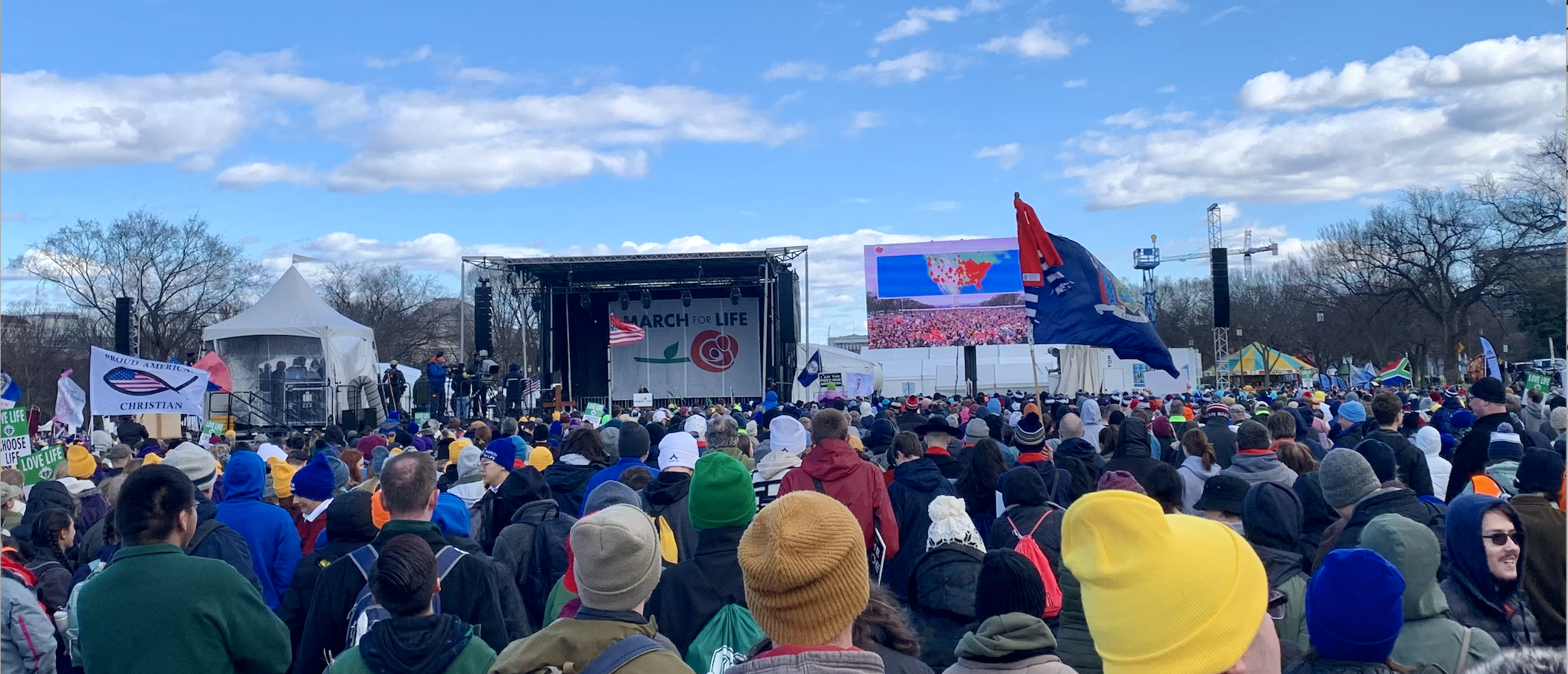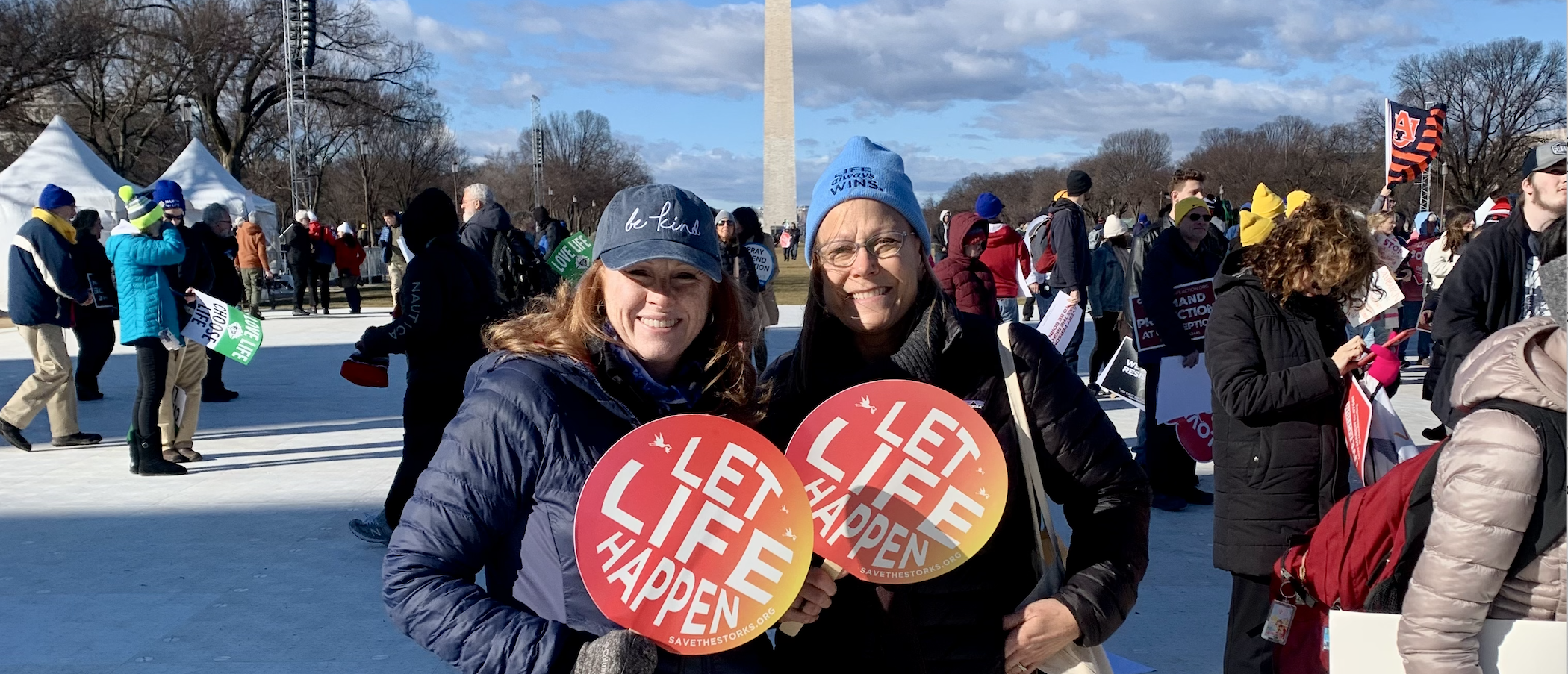The pro-life movement made its case for continued relevancy Friday during the first March for Life after Roe’s demise following Republicans’ lackluster midterm performance.
Following the Supreme Court’s decision in Dobbs v. Jackson Women’s Health Center, Republican candidates shied away from the abortion issue. Senate candidate Blake Masters in Arizona, who had previously called abortion “demonic,” later deleted language on his campaign website describing himself as “100% pro-life.” Even Donald Trump, the only sitting US president to speak at the rally in 2020, has blamed “those that firmly insisted on No Exceptions [to abortion]” for the GOP’s midterm performance.
The march’s theme — “Next Steps: Marching Into a Post-Roe America” — addresses another fresh issue the pro-life movement confronts. After Roe, the movement lacks a clear national target. Organized opposition to abortion looks more like several mini battles in various states, making the goal of a national march more complicated. (RELATED: Attorney Generals Plead With The FDA To Reverse Decision On ‘Abortion Inducing Drugs’)
“The overturn of Roe doesn’t make abortion illegal, what it does is it just gives freedom to the states,” Jeanne Mancini, March for Life president, told the Daily Caller. “So the question of is the pro-life movement relevant is kind of, that’s an insane question. Because of course it’s relevant, we haven’t built a culture of life in the United States. In this year alone, we’ll have well over 700,000 abortions.”

The Daily Caller
Mancini echoes much of the pro-life movement, arguing that 2022 midterm candidates who downplayed the abortion issue fared worse than those who were clear about their opinions on the matter. Susan B. Anthony Pro Life America criticized candidates who “took the ostrich” approach, in a post-midterm press call, pointing to openly pro-life candidates such as Ron DeSantis as evidence of the continued winning capabilities of the issue.
“My read of the election is that when politicians were clear on where they stood, and they were clear on where their opponents stood on this, they won,” Mancini told the Caller. “When they were vague on the pro-life issue they lost.”
We’re here at the March for Life, where pro-lifers are gathering for the first rally since the fall of Roe.
Follow along for live updates, as the pro-life movement makes its case for continued relevancy. @DailyCaller pic.twitter.com/9FVZopJdfX
— Sarah Weaver 💍 (@SarahHopeWeaver) January 20, 2023
After Dobbs, several states moved quickly to codify abortion as a constitutional right in their constitutions. Michigan and California passed constitutional amendments legalizing the procedure during the midterm elections, and Kansas famously rejected an abortion ban in the first referendum following Dobbs.
Abby Johnson, founder of And Then There Were None, a group that assists women seeking to leave the abortion industry, told the Caller that these losses are due to low conservative voter turnout and “lies” about what an abortion ban would really mean for women suffering from ectopic pregnancies. (RELATED: ‘Pro-Death Healthcare Has To Go’: Medical Experts Reveal Next Steps For Pro-Life Movement During 50th March For Life)
“Kansans had an opportunity to put forward pro-life legislation in their state, but there were so many lies that were being spread around that instead of getting to the bottom of it, conservatives just didn’t show up, they didn’t vote,” Johnson told the Caller.
“This life issue has got to be important to conservative voters,” Johnson continued. “To me it’s the most important thing because of my experience, but it’s got to start being more important than taxes and other issues that do really galvanize the conservative base.”
However, Kristan Hawkins, president of Students for Life of America, tells the Caller that it is pro-life activists who are the most galvanized base of the right-wing, a fact which Republican candidates would do best not to ignore.
“The people who go out and knock on doors, who become volunteers — the most emphatic people on your political campaigns — are not the people who want the flat tax, or argue for some sort of foreign policy, it’s pro-lifers,” Hawkins said. “It’s people who know what’s at stake with the election — little lives.”
The abortion issue has become more local, forcing states legislators to take a stand on the issue.
“People have kind of kicked the issue to the curb for years because Roe was in place, but now that it’s been overturned, the state is looking at the legislature and saying, ‘are you going to do what you said you were going to do for years?'” Ohio State representative Jena Powell told the Caller. (RELATED: Ahead Of The 50th Anniversary of Roe, 61% Of Americans Identify As Pro-Choice: POLL)
In blue states, such a task may not look like a complete ban on abortion from conception, Minnesota State Sen. Julia Coleman told the Caller. Politicians from blue or purple states will need to weed out the more “extreme” abortion policies.
“In some states zero legal abortion is feasible,” Coleman tells the Caller. “In states like mine, in blue states, no that’s not the goal. What we do see being feasible is being able to point out the horrifying things that are happening in third trimester abortions, and how best to reign in these extreme policies.”

The Daily Caller
Mississippi Attorney General Lynn Fitch says making the case for the pro-life policies after Dobbs will hinge on the movement’s ability to point out ways it can help both women and babies.
“I think every state will be different, but we have to stop and remember, when we make our case we need to put out there that it’s about empowering women and promoting lives,” Fitch told the Caller.
Mothers who spoke at Heartbeat International’s pre-march event Babies Go To Congress also told the Caller that the pro-life movement can win post-Dobbs if it emphasizes how abortion hurts both the mother and the child.
“It’s not just about saving a baby, because my life was saved,” Danielle, a mother who chose life after discovering a maternity home, told the Caller. “Having my baby saved my life.”
“I think we have to rally together and show the positive impact it’s had on people individually,” another mother, Evalynn, who had previously had two abortions before carrying her baby, Hezekiah, to term, said.


